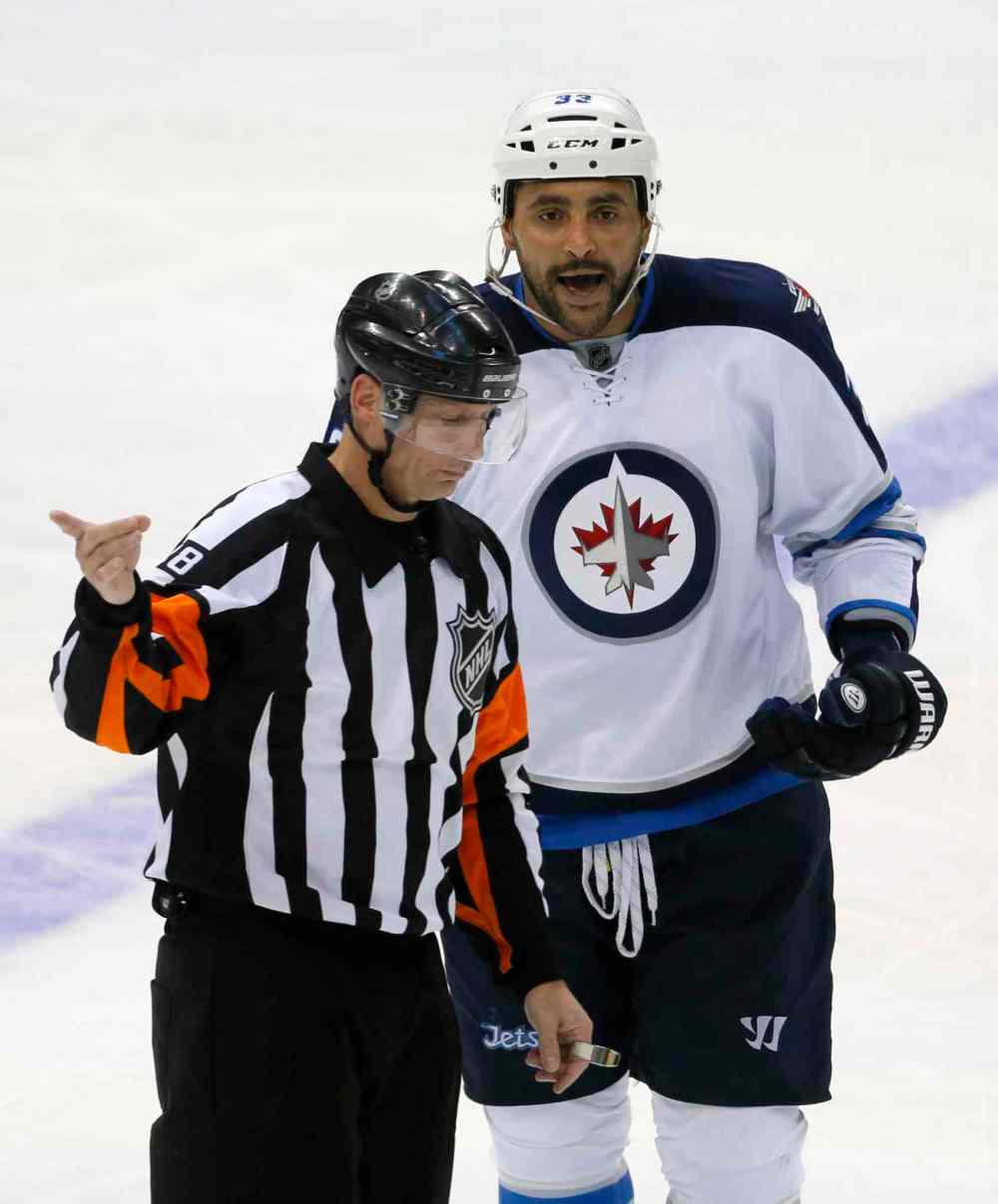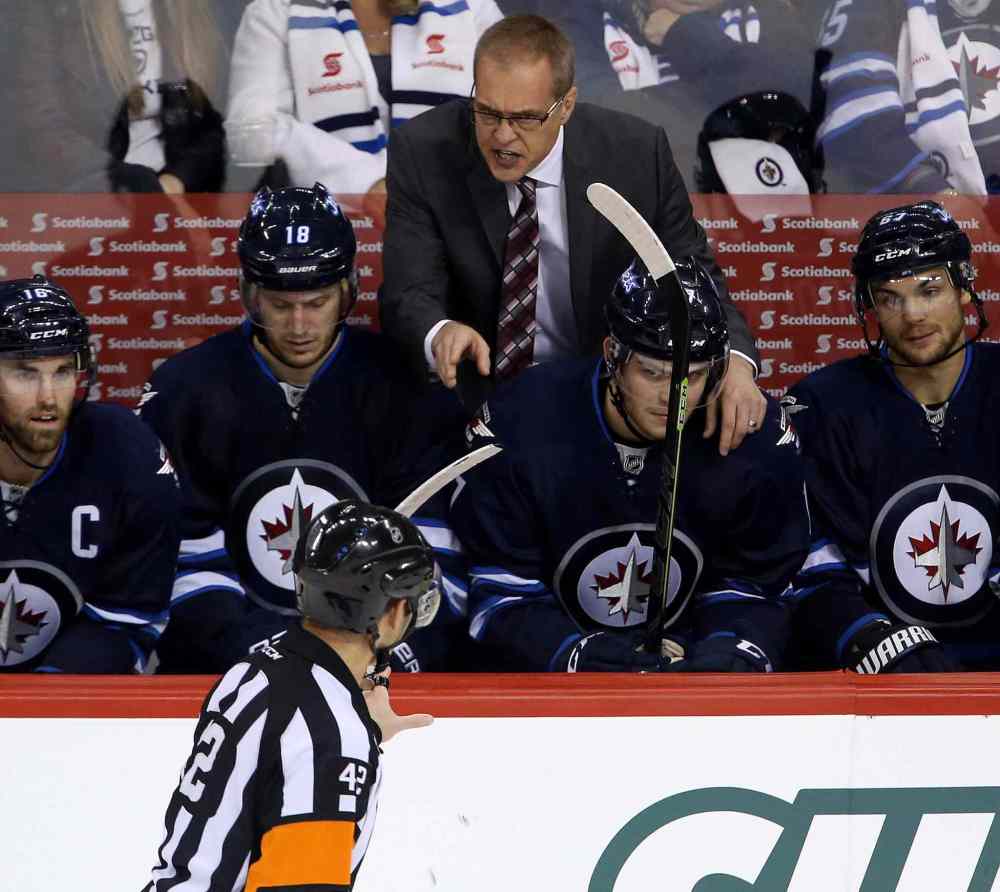Living in penalty hell
The Jets are still the NHL’s most short-handed team, and the numbers are getting worse
Advertisement
Read this article for free:
or
Already have an account? Log in here »
To continue reading, please subscribe:
Monthly Digital Subscription
$1 per week for 24 weeks*
- Enjoy unlimited reading on winnipegfreepress.com
- Read the E-Edition, our digital replica newspaper
- Access News Break, our award-winning app
- Play interactive puzzles
*Billed as $4.00 plus GST every four weeks. After 24 weeks, price increases to the regular rate of $19.00 plus GST every four weeks. Offer available to new and qualified returning subscribers only. Cancel any time.
Monthly Digital Subscription
$4.75/week*
- Enjoy unlimited reading on winnipegfreepress.com
- Read the E-Edition, our digital replica newspaper
- Access News Break, our award-winning app
- Play interactive puzzles
*Billed as $19 plus GST every four weeks. Cancel any time.
To continue reading, please subscribe:
Add Winnipeg Free Press access to your Brandon Sun subscription for only
$1 for the first 4 weeks*
*$1 will be added to your next bill. After your 4 weeks access is complete your rate will increase by $0.00 a X percent off the regular rate.
Read unlimited articles for free today:
or
Already have an account? Log in here »
Hey there, time traveller!
This article was published 19/11/2015 (3587 days ago), so information in it may no longer be current.

It may just be who the Winnipeg Jets are and you (and they) are going to have to live with it.
They are the NHL’s short-handed machine.
At the quarter mark of the 2015-16 season, the Jets are right back where they ended last season — leading the league in times short-handed.
It’s a road with a lot of potholes, but one the team successfully navigated on the way to the Stanley Cup playoffs last spring.
Will they be as fortunate this time around?
The 2014-15 Jets were the only team in the last three seasons to lead the NHL in times short-handed and qualify for the playoffs.
This season’s standing in this area is troubling again, and the pace is even more alarming.
Winnipeg has been short-handed 82 times through 20 games. The league average is 60.
Last season through 20 games, the Jets were short 69 times, itself a high number.
In terms of time, this season’s Jets are more than 15 minutes short-handed more than the next-worst team (the Anaheim Ducks) and are already at a deficit of more than 91 seconds per game in power-play time compared to their opposition.
Jets coach Paul Maurice has always answered the question with some level of concern about stick penalties and other preventable infractions, including those of the roll-your-eyes variety in the offensive zone, but almost always qualifies his remarks in this area by saying he wants his team to be an aggressive bunch and that he will be forgiving of penalties taken in this mode.

The fear, he has said, is that if he puts a huge emphasis on simply reducing penalties, the Jets will turn into a too-passive, non-competitive bunch.
So while he may implore his charges to be a little less reckless, the fine line Maurice prefers does have risk.
For instance, when the tally of power-play opportunities goes in favour of the Jets’ opposition, the chances of the Jets winning are diminished.
Last season’s larger sample shows this — in the 39 times the Jets had to kill more penalties than their opponents, their record was 18-18-3. For a team that ended 17 games above .500, that’s a telling stat.
This season, some bullets have been dodged. The Jets are .500 at 9-9-2 and have been short-handed more than their opponents 11 times, with a 5-4-2 mark so far.
Wednesday’s 4-1 win over the Vancouver Canucks at the MTS Centre was one such occasion. Winnipeg was short-handed five times to Vancouver’s four, but it’s worth noting that the Canucks’ goal was a power-play marker converted after an offensive-zone penalty for interference taken by Winnipeg’s Toby Enstrom.
There is also risk in overtaxing your front-line players who are penalty-killers, and the Jets have plenty of those such as Bryan Little, Andrew Ladd, Blake Wheeler, Jacob Trouba and Tyler Myers.

Argue all you want about phantom calls or NHL officials picking on the Jets with what Maurice has called “jaywalking” calls, the longer-term trend doesn’t really lend itself to conspiracies.
Since the 2011 relocation, the Jets are simply a team that takes a lot of penalties.
In the four complete seasons here to this point, the Jets have been highest (2014-15), sixth-highest (2013-14) and seventh-highest (2011-12) overall in this first-is-worst department.
The anomaly is the lockout season, when Winnipeg’s 138 short-handed occasions was the league’s second-lowest.
The question entering the second quarter, which starts with Saturday’s home game against the Arizona Coyotes, is whether you can get this sort of affliction under control.
And there is evidence you can.
Late last season, with their season riding precariously on late results, the Jets got themselves under control.
Even though they still finished worst in the NHL in times short-handed, they took more penalties than their opponents in only five of the last 19 games of the season.
And even if you wanted to account for the closeness of games at that time of the season and say a 4-3 or 2-1 tally in penalties is basically a wash on any given night, then there was only once instance in the final 19 games when Winnipeg was poor in this department, going four times short-handed to only once by the Montreal Canadiens, a 4-1 Winnipeg win by the way.






